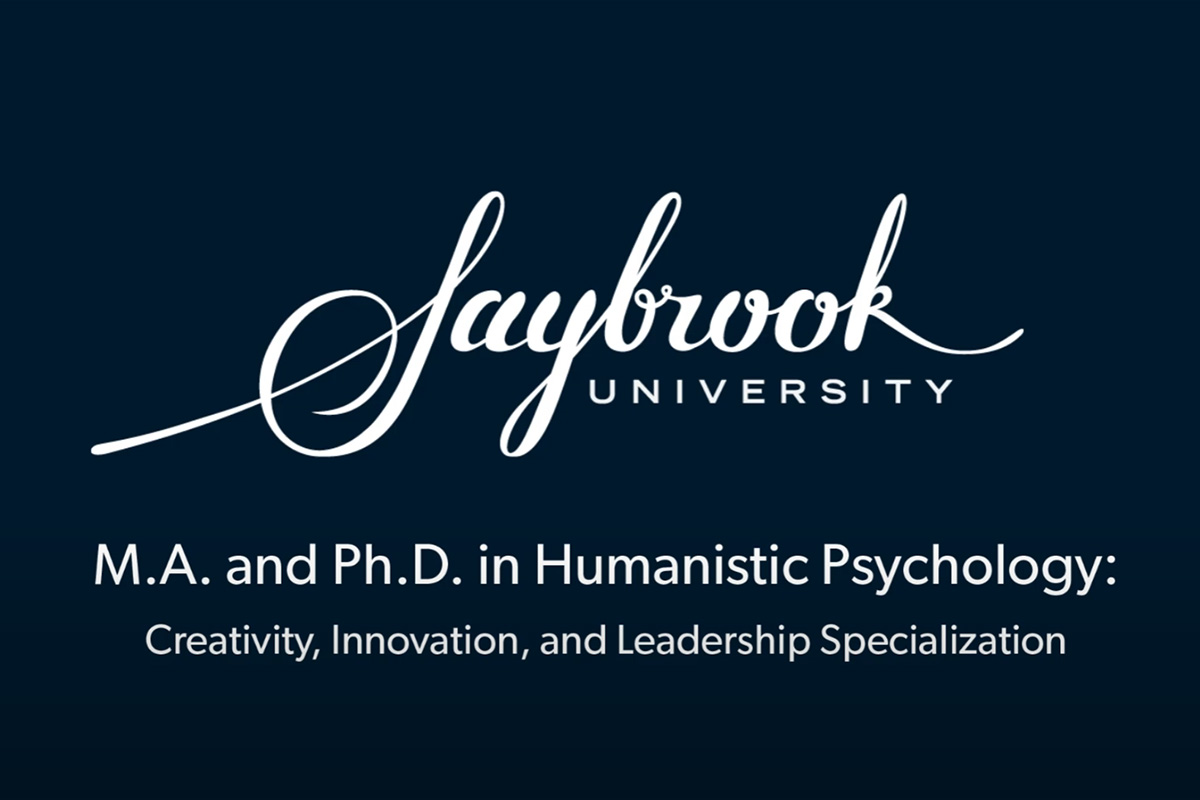Where Breakthrough Thinking and Visionary Leadership Unite
Our Master's in Psychology: Creativity, Innovation, and Leadership is an online leadership program dedicated to nurturing the creative drive within each of us. Emerge with a deep understanding of the cognitive, emotional, and social factors that fuel innovation and breakthrough thinking. Within the online creative leadership psychology master's degree, you will study creative and thought leadership models, innovative development, build and critically analyze creative processes within teaching and work environments. Creative and innovating thinking and its role in developing a healthy psyche, self-knowledge, self-realization, and the expansion of consciousness, all essential to consider within a framework of humanistic, existential, and transpersonal psychologies. You will also engage in experiential exercises and collaborative projects to unlock your own creative potential within the joy, optimism and possibilities that exist.
Online Master's in Psychology: Creativity, Innovation, and Leadership Job Outcomes
Upon completion of the Creativity Leadership psychology online program, you will have an enhanced skill set and deepened perspective to augment your current practice or career. Additionally, with the appropriate licensure, when necessary, you may expand into other roles, including:
- Expressive art therapist
- University professor
- Research assistant
- Leadership and organizational development
- Consultant
- Organizational consultant
- Innovation director
- Creative director
- Educational consultant
Other Online Master's in Psychology Programs
Interested in another specialization in psychology? We offer multiple master's programs online that may align more closely with your goals.
- M.A. in Psychology
- M.A. in Psychology: Consciousness, Spirituality, and Integrative Health Specialization
- M.A. in Psychology: Existential and Humanistic Psychology Specialization
*Credits earned may vary based on specialization courses chosen.
Program Components
Admissions Requirements
At a minimum, you must have received or anticipate receiving prior to the start of the semester you are applying to, a bachelor’s degree from a regionally accredited college or university before applying for a master’s degree at Saybrook. Applicants for the M.A. in Psychology: Creativity, Innovation, and Leadership Specialization degree must submit the following documents:
- An official transcript from an accredited university demonstrating successful completion of a bachelor’s degree, with a 3.0 GPA or better, though exceptions may be made
- Resume or CV
- Personal statement
Invest in Your Future
Saybrook University remains committed to keeping higher education affordable and accessible. Our Financial Aid Department is ready to offer guidance and support in determining suitable financial assistance tailored to your needs, including potential scholarship opportunities, grants, and more.
Cost
Saybrook wants you to have the information you need to make an informed decision about your academic and career aspirations. Our cost calculator provides an estimated cost of attending Saybrook to earn your M.A. in Psychology: Creativity, Innovation, and Leadership Specialization degree.
Sample Courses
Introduction to Creativity, Innovation, and Leadership
In this three-credit course, the connections between the constructs of creativity, innovation, and creative/thought leadership are examined in relation to socio-cultural influences, gender, organizational structures, and through a lens of transformational and transactional leadership. The course examines creative process models, innovative product development and acquisition along with creative leadership models. Imagery and symbolization, intrapsychic experience, and aesthetic issues are explored inclusive of art-based research.
Applications of Creativity, Innovation, and Leadership
This three-credit course is designed to assist with deeper transfer of knowledge from the theoretical to the applied aspects of utilizing creative processes and developing real-life projects that test currently accepted models. Creative leadership is put into practice through individual and group activities and taps into the practical function and use of both transformational and transactional conceptualization.
Arts-Based Inquiry
This three-credit course examines select forms of thinking about and engaging , art-based inquiry, inclusive of its relevance to traditional research processes and forms of scientific inquiry. This course further allows for the exploration of utilizing methodological designs that incorporate the various iterations of a variety of “art” mediums as data and outcome resources that make for unique applications across a variety of phenomena.
Catalog
Please refer to our academic catalog for more information on the M.A. in Psychology: Creativity, Innovation, and Leadership Specialization program.
Career Outcomes
Saybrook University prepares you to make an impact in a variety of high-demand careers. Below, you will find possible career options and salaries associated with this degree.
Data is pulled by a third-party tool called Lightcast, which includes data from sources including the U.S. Bureau of Labor Statistics, the U.S. Census Bureau, online job postings, and other government databases. The information below represents a regional and national career outlook related to this degree program*. Saybrook University is dedicated to assisting you in achieving your career goals.
*Many degree programs are intended to fulfill licensure requirements in specific states. The data shown here may not represent the state where you currently reside. For more information on how this program is applicable to the requirements of your state, please speak with your admissions specialist.
University Learning Experience
Our M.A. in Psychology: Creativity, Innovation, and Leadership Specialization program is a 100% online program. While the core of this program is completed asynchronously, there are some synchronous, online features designed to deepen your educational experience. We call this a Virtual Learning Experience (VLE). In addition to the VLE, you will begin your studies with a virtual Welcome Week. Welcome Week activities, including a program orientation, are held online during the week before the start of Fall and Spring semesters. All Psychology students will be required to attend only the five-day, fall semester Virtual Learning Experience (VLE) each academic year. The in-person Community Learning Experience (CLE) is also available for you to explore. The CLE is held in odd-numbered years. It is optional and not required to complete the program.

Psychology Faculty
Saybrook’s Psychology faculty are practitioner-scholars dedicated to advancing their field through continued practice and comprehensive instruction. Meet some of our faculty members below.

- Director of Creativity, Innovation, and Leadership Specialization
- Faculty Senate Member
UNBOUND: Humanistic Psychology
Designed for those who wish to contribute creatively to improving the human condition. Students are encouraged to explore complementary approaches—including meditation, nutrition, energy medicine, biofeedback, and spirituality—alongside more traditional forms of care.


Alumni Stories: Darlene Viggiano, Ph.D. (MFT)

Famous Athletes and Sport Psychology
Ready to Take the Next Step?
Submit an inquiry and one of our admissions specialists will connect with you to answer your questions and guide you through next steps.

























